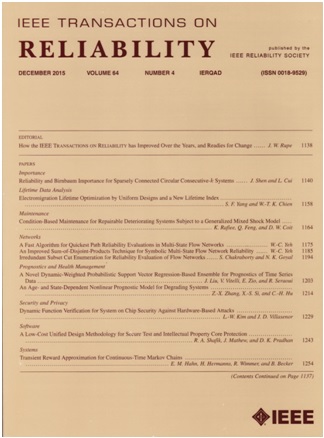Improved Methods for Distribution Identification and Regression Parameter Estimation in a Satellite Reliability Application
IF 5.7
2区 计算机科学
Q1 COMPUTER SCIENCE, HARDWARE & ARCHITECTURE
引用次数: 0
Abstract
This article expands the methods for analyzing satellite reliability by presenting a framework of measures to determine the best statistical distribution to use in data parameterization, and applying robust regression to improve the fit of the Weibull distribution in the regression parameterization method when data outliers are present. The distribution identification framework is defined by four statistical goodness-of-fit measures, while the robust regression methodology is developed through comparing how least-squares and iteratively reweighted least squares robust linear regression can parameterize satellite reliability data. Both of these methodologies are then applied to deep space satellite reliability data to evaluate their performance. All four measures comprising the distributional assessment framework show agreement by selecting the Weibull distribution. These results serve as a proof of concept for the framework and warrant its inclusion in future satellite reliability studies. Robust regression's use in the regression parameterization method in the presence of outliers yielded positive results. Specifically, improvement is indicated through visual inspection of the resulting Weibull distribution, and by closer agreement of the robust regression Weibull parameters to the MLE parameters than the least-squares regression parameters. Ultimately, the improved fit produced by the use of robust regression in the regression parameterization method justifies its increased computational complexity as compared to traditional least-squares regression. Incorporation of these methods and framework provides quantitative enhancements to distribution fitting and parameter estimation in satellite reliability studies.卫星可靠性分布辨识与回归参数估计的改进方法
本文扩展了分析卫星可靠性的方法,提出了一套措施框架,以确定用于数据参数化的最佳统计分布,并在存在数据异常值时应用稳健回归来改善回归参数化方法中威布尔分布的拟合。通过比较最小二乘和迭代再加权最小二乘稳健线性回归对卫星可靠性数据参数化的影响,建立了稳健回归方法。然后将这两种方法应用于深空卫星可靠性数据以评估其性能。通过选择威布尔分布,组成分布评估框架的所有四个度量都显示出一致性。这些结果证明了该框架的概念,并保证将其纳入未来的卫星可靠性研究。鲁棒回归在存在异常值的回归参数化方法中的应用取得了积极的结果。具体来说,改进是通过目视检查得到的威布尔分布,以及鲁棒回归威布尔参数比最小二乘回归参数更接近MLE参数来表明的。最终,在回归参数化方法中使用鲁棒回归所产生的改进拟合证明,与传统的最小二乘回归相比,它增加了计算复杂性。这些方法和框架的结合为卫星可靠性研究中的分布拟合和参数估计提供了定量的增强。
本文章由计算机程序翻译,如有差异,请以英文原文为准。
求助全文
约1分钟内获得全文
求助全文
来源期刊

IEEE Transactions on Reliability
工程技术-工程:电子与电气
CiteScore
12.20
自引率
8.50%
发文量
153
审稿时长
7.5 months
期刊介绍:
IEEE Transactions on Reliability is a refereed journal for the reliability and allied disciplines including, but not limited to, maintainability, physics of failure, life testing, prognostics, design and manufacture for reliability, reliability for systems of systems, network availability, mission success, warranty, safety, and various measures of effectiveness. Topics eligible for publication range from hardware to software, from materials to systems, from consumer and industrial devices to manufacturing plants, from individual items to networks, from techniques for making things better to ways of predicting and measuring behavior in the field. As an engineering subject that supports new and existing technologies, we constantly expand into new areas of the assurance sciences.
 求助内容:
求助内容: 应助结果提醒方式:
应助结果提醒方式:


